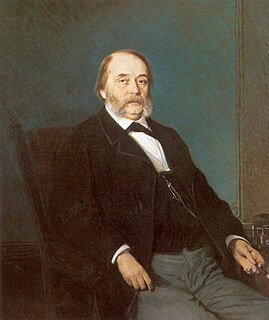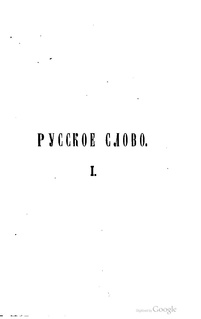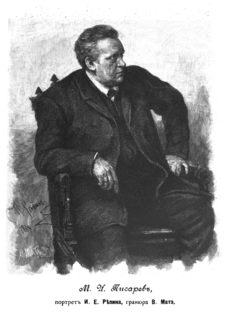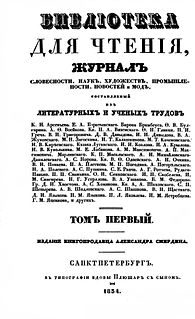
Ivan Alexandrovich Goncharov was a Russian novelist best known for his novels A Common Story (1847), Oblomov (1859), and The Precipice (1869). He also served in many official capacities, including the position of censor.

Apollon Aleksandrovich Grigoryev ; was a Russian poet, literary and theatrical critic, translator, memoirist and author of popular art songs.

Sovremennik was a Russian literary, social and political magazine, published in Saint Petersburg in 1836-1866. It came out four times a year in 1836-1843 and once a month after that. The magazine published poetry, prose, critical, historical, ethnographic and other material.

Dmitry Vasilyevich Grigorovich was a Russian writer, best known for his first two novels, The Village and Anton Goremyka, and lauded as the first author to have realistically portrayed the life of the Russian rural community and openly condemn the system of serfdom.

Without a Dowry is a play by Alexander Ostrovsky that premiered on 22 November [O.S. 10 November] 1878 at the Maly Theater and first published in the January 1879 issue of Otechestvennye Zapiski. Met with indifference by the contemporary critics, later it came to be regarded as a classic of the Russian theatre. Yakov Protazanov directed a cinematic adaptation, Without Dowry, which was released in 1937, and Eldar Ryazanov also adapted it into a popular 1984 film.
The Poor Bride is a play by Alexander Ostrovsky, written in 1851 and first published in the No.4, 1852 issue of Moskvityanin magazine. It was his first play to be staged at the Maly Theatre, where it premiered on 20 August 1853.
It's a Family Affair-We'll Settle It Ourselves is a comedy by Alexander Ostrovsky. It was his first major work, written in 1849 and published in the No.6 1850 Moskvityanin issue. Having caused a furore, it was banned by the Imperial Theatres' censorship committee and was staged for the first time on 9 December 1860, ten years after its publication. For some time the play has been also referred to as The Bankrupt, which was its original title.
Stay in Your Own Sled is a play by Alexander Ostrovsky, written in 1852 and first published in the No.5, 1853, issue of Moskvityanin. It was premiered in the Maly Theatre on January 14, 1853.
Sin and Sorrow Are Common to All is a four-act drama by Alexander Ostrovsky, written in 1852 and published on the No. 1, 1863 issue of Vremya magazine, edited by the Dostoyevsky brothers. It premiered in the Maly Theatre in Moscow, on 21 January 1863, as a benefit for director Alexander Bogdanov. Later that year, Ostrovsky was awarded the Uvarov Prize for it.
An Ardent Heart is a play by Alexander Ostrovsky written in 1858 and first published in the January 1869 issue of Otechestvennye Zapiski. It was premiered on 15 January 1869, at the Moscow's Maly Theatre and then on 29 January at the Saint Petersburg's Alexandrinsky Theatre.
It's Not All Shrovetide for the Cat is a play by Alexander Ostrovsky written in 1871 and first published in the No. 9, September 1871 issue of Otechestvennye Zapiski. It was premiered on October 7, 1871, in Moscow's Maly Theatre.

The Forest is a play by Alexander Ostrovsky written in 1870 and first published in the January 1871 issue of Otechestvennye Zapiski magazine. It was premiered at Saint Petersburg's Alexandrinsky Theatre on 1 November 1871, as a benefit for actor Fyodor Burdin. In Moscow's Maly Theatre it was performed on November 26, 1871.

Anton-Goremyka is a novel by Dmitry Grigorovich, first published by Sovremennik, in 1847, vol. 6, issue XI. In retrospect it is regarded as arguably the strongest anti-serfdom statement in the Russian literature of its time.

Russkoye Slovo was a Russian weekly magazine published in Saint Petersburg in 1859-1866 by its owner, Count Grigory Kushelev-Bezborodko.

Fyodor Alexeyevich Burdin was a Russian actor, best remembered for his parts in the Alexandrinsky Theatre productions of plays by his best friend Alexander Ostrovsky, whose rise to fame had a lot to do with Burdin's enthusiasm about the playwright's work, his connections in high places and considerable entrepreneurial talents.

Nikolai Alexandrovich Chayev was a Russian writer, poet and playwright.
The Society of Russian Dramatists and Opera Composers was an organisation launched in 1874 in Moscow with a view to defending the rights of the authors of music and drama in Russia.

Modest Ivanovich Pisarev was a Kashira-born Russian stage actor, reader in drama and theatre critic.




















